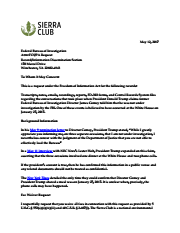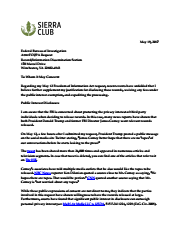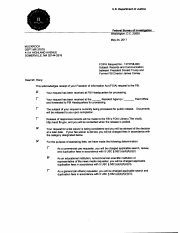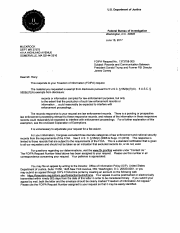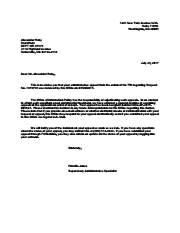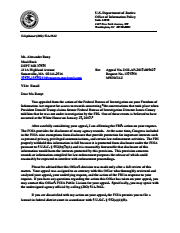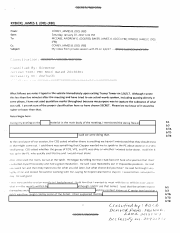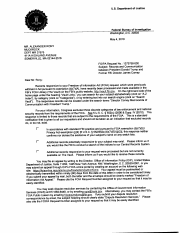Comey-Trump Conversations
| Tracking # |
1373758-000 1373758-000, DOJ-AP-2017-005627 |
| Submitted | May 12, 2017 |
MuckRock users can file, duplicate, track, and share public records requests like this one. Learn more.
Communications
From: Alexander Rony
To Whom It May Concern:
This is a request under the Freedom of Information Act for the following records:
Transcripts, notes, emails, recordings, reports, FD-302 forms, and Central Records System files regarding the conversations that took place when President Donald Trump claims former Federal Bureau of Investigation Director James Comey told him that he was not under investigation by the FBI. One of these events is believed to have occurred at the White House on January 27, 2017.
Attached please find a PDF version of this FOIA request for enhanced readability.
Background Information
In his May 9 termination letter to Director Comey, President Trump stated, “While I greatly appreciate you informing me, on three separate occasions, that I am not under investigation, I nevertheless concur with the judgment of the Department of Justice that you are not able to effectively lead the Bureau.” https://assets.documentcloud.org/documents/3711113/Comey-White-House-DOJ-DAG.pdf
In a May 11 interview with NBC News's Lester Holt, President Trump expanded on this claim, asserting that the three occasions involved one dinner at the White House and two phone calls. http://www.cnn.com/2017/05/11/politics/transcript-donald-trump-nbc-news/
If the president’s account is true, then he has confirmed this information in a public venue and any related documents should not be treated as confidential.
The New York Times detailed the only time they could confirm that Director Comey and President Trump shared a meal was on January 27, 2017. It is unclear when, precisely, the phone calls may have happened. https://www.nytimes.com/2017/05/11/us/politics/trump-comey-firing.html
Fee Waiver Request
I respectfully request that you waive all fees in connection with this request as provided by 5 U.S.C. § 552(a)(4)(A)(iii) and 40 C.F.R. § 2.107(l). The Sierra Club is a national environmental nonprofit with no commercial interest in obtaining the requested information. Instead, our organization intends to analyze and disseminate the requested information free of charge so that the public can be better informed and meaningfully participate in government oversight.
As explained below, this FOIA request satisfies the factors listed in the Justice Department's governing regulations for waiver or reduction of fees – as well as the requirements of fee waiver under the FOIA statute – that “disclosure of the information is in the public interest because it is likely to contribute significantly to public understanding of the operations or activities of the government and is not primarily in the commercial interest of the requester.” 5 U.S.C. § 552(a)(4)(A)(iii), see also 40 C.F.R. § 2.107(l).
The subject matter of the requested records is likely to contribute significantly to public understanding of the operations and activities of the government by settling the disputed issue that Director Comey disclosed to President Trump that the FBI was not investigating the president.
Detailing the status of a criminal investigation to an associated individual is against agency protocol. In the New York Times article mentioned above and a follow-up NBC News story, multiple anonymous sources close to former Director Comey disputed the president’s claims. http://www.nbcnews.com/news/investigations/my-dinner-comey-current-former-fbi-officials-dispute-trump-account-n758221
The individuals, including current and former FBI officials, told the news outlets that Director Comey never would have told the president he was not under investigation, that Director Comey did not ask to keep his job during the conversation, and that Director Comey did not request the dinner. White House Deputy Press Secretary Sarah Huckabee Sanders, in turn, denied the sources’ claims that the president asked Director Comey for a pledge of loyalty.
Several of these disputes are clearly in the public interest, as evidenced by the large amount of news coverage as well as the strong concerns expressed by members of Congress and legal and ethics experts. Additionally, information related to these conversations would help shed a light on why the director of the FBI was abruptly fired without a clear successor having been identified. Clarification on these matters is needed to protect the integrity of an independent FBI.
The Sierra Club and its supporters have demonstrated interest and expertise in the subject area, specifically the development of policies designed to safeguard our democracy, enforce the rule of law, and ensure government transparency. The Sierra Club maintains an active Democracy program and weighs in when nominations and legislation affect that work. In recent months, tens of thousands of our supporters have sent letters to government officials regarding the “Trump-Russia” investigation.
Media Requester Status
The Sierra Club has the ability and intention to disseminate the information it receives through this request. The information may be shared through emails to an audience reaching into the millions, Facebook and Twitter posts reaching tens of thousands of followers, articles on our often-visited website, and analysis provided to the media.
My professional duties at the Sierra Club include composing mass communications to our followers, analyzing FOIA responses, and coordinating with press secretaries. Here are three such examples that resulted from my work:
https://sierraclub.org/planet/2017/04/hiring-freeze-prevented-epa-filling-hundreds-jobs
http://www.cnn.com/2017/04/13/politics/epa-hiring-freeze/index.html
http://www.centerforfoodsafety.org/press-releases/4480/over-700000-people-tell-government-to-block-seed-mergers
The bulk of my work entails planning and writing content about public policy and distributing it through email, webpages, and social media.
I ask that, in addition to being granted a public interest fee waiver, I be properly categorized as a representative of the news media, as the information I have presented shows that I meet the definition expressed in 28 CFR § 16.10(b)(6): “any person or entity that actively gathers information of potential interest to a segment of the public, uses its editorial skills to turn the raw materials into a distinct work, and distributes that work to an audience.
Expedited Treatment
Due to the exceptional circumstances surrounding the Trump-Russia investigations and the FBI director's ouster, I request expedited treatment of this FOIA request, which meets two of the Department of Justice’s possible rationales for granting expedited processing.
28 C.F.R. § 16.5(e)(1)(iv) provides for expedited processing when there is a "matter of widespread and exceptional media interest in which there exist possible questions about the government's integrity that affect public confidence."
President Trump himself alluded to the lack of public confidence in the government’s investigations in his May 9 termination letter: “It is essential that we find new leadership for the FBI that restores public trust and confidence in its vital law enforcement mission.” This is juxtaposed against a number of news articles and prominent individuals that question the president’s rationale for firing Director Comey, dispute his recollection of the content of their conversations, and express concerns over the integrity of the FBI’s future investigations.
In addition to the articles mentioned in the Background Information and Fee Waiver Request sections, one may find a large amount of news covering the disputed content of the Trump-Comey conversations. Here are a few additional examples:
http://www.chicagotribune.com/news/nationworld/ct-trump-comey-holt-20170511-story.html
http://www.nydailynews.com/news/national/president-trump-fires-fbi-director-james-comey-article-1.3150918
http://www.motherjones.com/politics/2017/05/donald-trump-firing-james-comey-investigation-fbi-russia
http://www.npr.org/2017/05/11/527950704/trump-says-he-called-comey-and-asked-if-he-was-under-investigation
28 C.F.R. § 16.5 (e)(1)(ii) provides the other relevant rationale for an expedited processing determination: "An urgency to inform the public about an actual or alleged federal government activity, if made by a person primarily engaged in disseminating information."
As described in the Media Requester Status section, my primary professional activity is information dissemination. This request meets the three primary factors in determining whether there is an urgency to inform:
1. The request concerns a matter of current exigency to the American public, given the central roles the involved officials play in the Trump-Russia investigation and the possibility that top administration officials are using their positions to influence it. Furthermore, the president is likely to nominate a replacement FBI director in the coming days ahead; U.S. senators and citizens should have these documents available at that time to provide context during the confirmation process.
2. The consequences of delaying a response would compromise a significant recognized interest. Delaying this information through the normal FOIA process would represent a clear loss in value to the developing breaking news story and could impact the ability of the FBI to reliably conduct its investigation in an independent manner.
3. The request concerns federal government activity: conversations that occurred between the White House and the FBI pertaining to work that FBI agents are conducting.
The information contained in this request is true and correct to the best of my knowledge and belief.
Exempt Records
Should you decide to invoke a FOIA exemption with regard to any of the requested records, please include in your response letter sufficient information for an appeal, including:
1. Basic factual material about each withheld item, including the originator, date, length, general subject matter, and location of each item.
2. Explanations and justifications for denial, including the identification of the category within the governing statutory provision under which the document (or portion thereof) was withheld and a full explanation of how each exemption fits the withheld material.
If you determine that portions of a requested record are exempt from disclosure, please redact the exempt portions and provide the remainder of the record.
Record Delivery
I would prefer the request filled electronically, by e-mail attachment if available or CD-ROM if not. In the event that there are fees, please inform me of the total charges in advance of fulfilling my request.
Please produce the records on a rolling basis; at no point should the search for – or deliberation concerning – certain records delay the production of others that the agency has already retrieved and elected to produce.
Thank you in advance for your anticipated cooperation in this matter. I look forward to receiving your timely response.
Sincerely,
Alexander Rony
Sierra Club
Enclosures: (5 pages)
From: Alexander Rony
To Whom It May Concern:
Regarding my May 12 Freedom of Information Act request, recent events have unfolded that I believe further supplement my justification for disclosing these records, waiving any fees under the public interest exemption, and expediting the processing.
I am aware that the FBI is concerned about protecting the privacy interest of third party individuals when deciding to release records. In this case, many news reports have shown that both President Donald Trump and former FBI Director James Comey want relevant records released.
On May 12, a few hours after I submitted my request, President Trump posted a public message on the social media site Twitter stating, "James Comey better hope that there are no 'tapes' of our conversations before he starts leaking to the press!"
The tweet, located at https://twitter.com/realDonaldTrump/status/863007411132649473, has been shared more than 24,000 times and appeared in numerous articles and television segments.
In case that tweet is deleted, you can find one of the articles that refer to it at http://thehill.com/homenews/administration/333081-trump-warns-comey-better-hope-there-are-no-tapes-of-our-meeting.
Comey's associates have told multiple media outlets that he also would like the tapes to be released. NBC News reporter Ken Dilanian quoted a source close to Comey as saying, "He hopes there are tapes. That would be perfect." CNN quoted another source saying that Comey is "not worried about any tapes."
http://www.nbcbayarea.com/news/national-international/Trump-Explanation-Comey-Firing-Showboat-Loyalty-422078403.html
http://www.cnn.com/2017/05/12/politics/james-comey-dinner-trump/index.html
While these public expressions of consent are not direct to me, they indicate that the parties involved in this request have shown willingness to have the records released at large. Furthermore, courts have found that significant public interest in disclosure can outweigh personal privacy interest; see Multi Ag Media LLC v. USDA, 515 F.3d 1224, 1228 (D.C. Cir. 2008). It is important to note while making this evaluation that FOIA mandates a "strong presumption in favor of disclosure;” see Nat'l Ass'n of Home Builders v. Norton, 309 F.3d 26, 32 (D.C. Cir. 2002).
http://caselaw.findlaw.com/us-dc-circuit/1066144.html
http://www.leagle.com/decision/2002335309F3d26_1331/NATIONAL ASS'N OF HOME BUILDERS v. NORTON
The news coverage of these documents has clearly demonstrated the highest public interest possible, cutting across partisan lines. The conservative-leaning New York Post and Wall Street Journal, for example, have each stated that the memos and tapes should be released, as have members of Congress representing both parties.
https://nypost.com/2017/05/17/the-public-needs-to-see-all-jim-comeys-memos
https://www.wsj.com/articles/release-the-comey-tapes-1495063623
https://townhall.com/tipsheet/katiepavlich/2017/05/17/senate-intel-give-us-the-comey-memos-n2328193
The significant public interest in disclosure is self-evident, but is also presented in my original request on May 12. Given that both of the individuals named in the request have indicated their support for the release of related records, one must reason that the public interest outweighs the personal privacy interest in this matter.
Further information has also been publicized that help to identify dates when President Trump and then-Director Comey talked.
In addition to the January 27 dinner that was known at the time of my May 12 letter, new information has been reported by the New York Times that “President Trump called the F.B.I. director, James B. Comey, weeks after he took office and asked him when federal authorities were going to put out word that Mr. Trump was not personally under investigation, according to two people briefed on the call.”
https://www.nytimes.com/2017/05/18/us/politics/james-comey-memo-fbi-trump.html?smid=tw-share
Another call was described on March 1 and was reported by Mr. Comey’s friend Benjamin Wittes as a probe into Mr. Comey’s loyalty to President Trump. This March 1 phone call appears to have preceded the other call, which likely took place later in March.
As was divulged in this article, Mr. Comey composed detailed memos following every conversation he had with President Trump, and those memos have already been given to congressional investigators.
This newly-disclosed information sheds further light on the two phone calls and one dinner meeting where President Trump claimed then-Director Comey told him he was not personally under investigation. It appears that this January 27 dinner, March 1 phone call, and the other phone call may have been the occasions that President Trump was thinking of in his interview. As such, they should fall under the scope of my original request in order to determine which party – Mr. Trump or Mr. Comey – has the correct recollection regarding the conversations’ content.
Thank you in advance for your anticipated cooperation in this matter. I look forward to hearing your decision on my request for expedited processing.
Respectfully,
Alexander Rony
Sierra Club
Enclosures: (3 pages)
From: Federal Bureau of Investigation
An acknowledgement letter, stating the request is being processed.
From: Federal Bureau of Investigation
The request has been rejected by the agency.
From: Alexander Rony
Re: Freedom of Information Act Appeal (Request No. 1373758-000)
Dear OIP Director Pustay,
I am appealing the Federal Bureau of Investigation’s decision to withhold documents responsive to my Freedom of Information Act request (No. 1373758-000).
Background Information
On May 12, 2017, I submitted a request for records pertaining to conversations between President Donald Trump and former FBI Director James Comey. On May 19, I supplemented that request with additional context.
Mr. Comey later testified in front of the Senate Select Committee on Intelligence, submitting a statement for the record with details of his conversations with Mr. Trump. That statement can be found at https://www.intelligence.senate.gov/sites/default/files/documents/os-jcomey-060817.pdf.
As indicated in Mr. Comey’s statement, the conversations relevant to my request took place on January 6 at the Trump Tower; January 27 in the Green Room of the White House; February 14 in the Oval Office of the White House; March 30 over the phone; and April 11 over the phone. Mr. Comey confirmed that he wrote multiple memos following conversations he had with Mr. Trump, including at least one that was unclassified.
On June 16, the FBI rejected my request, stating that “the material you requested is exempt from disclosure pursuant to 5 U.S.C. § 552(b)(7)(A)” and that “the records responsive to your request are law enforcement records. There is a pending or prospective law enforcement proceeding relevant to these responsive records, and release of the information in these responsive records could reasonably be expected to interfere with enforcement proceedings.”
Investigation Interference
I am appealing the finding that the release of the documents “could reasonably be expected to interfere” with law enforcement proceedings. The existence and content of at least some of the records have already been confirmed under oath by the former FBI director. Therefore, their disclosure would have minimal to no impact on law enforcement proceedings.
As Mr. Comey testified, the FBI had no active investigation into Mr. Trump at the time of Mr. Comey’s termination. Obviously, these records were not created for any investigation, since one did not yet exist. So the existence and content of these documents would not disclose the existence or extent of any current investigations that followed the documents’ creation.
Mr. Trump has already denied aspects of Mr. Comey’s testimony, which were documented in his post-conversation memos. For these specific documents, then, disclosure would not present any ironclad proof of guilt. It is expected that the information in these records has already been confirmed (and disputed) in a public setting.
Exemption (b)(7)(A) does not cover all records that relate in some manner to law enforcement. They must “reasonably be expected to interfere” with law enforcement proceedings. That bar is not cleared in this case, as at least some of the information has already been disclosed and therefore could not interfere with any future proceedings.
Exempt Records
I am also appealing the FBI’s decision not to provide me with adequate information on the withheld documents for this appeal. In my original request, I stated:
“Should you decide to invoke a FOIA exemption with regard to any of the requested records, please include in your response letter sufficient information for an appeal, including:
“1. Basic factual material about each withheld item, including the originator, date, length, general subject matter, and location of each item.
2. Explanations and justifications for denial, including the identification of the category within the governing statutory provision under which the document (or portion thereof) was withheld and a full explanation of how each exemption fits the withheld material.
“If you determine that portions of a requested record are exempt from disclosure, please redact the exempt portions and provide the remainder of the record.”
I received no basic factual matter for withheld items as requested, which imposes a significant burden upon me to argue that responsive records were inadequately declared exempt, since I have no context for the documents to prove otherwise.
Non-Exempt Portions
I am appealing the FBI’s decision not to release non-exempt portions of records. Even if parts of the requested documents are properly subject to an exemption, the FBI has an obligation to redact non-exempt portions of the documents and release those portions that are non-exempt under FOIA.
The Justice Department's own guidance memo from former Attorney General Eric Holder, which appears to still be in effect, instructs offices and bureaus to err on the side of disclosure and administer a presumption of openness. The FBI refused to do this for any of its responsive records for this request, nor did it offer any context for what those documents contain, and as such it must be assumed that the FBI is being overbroad in its application of Exemption 7(a).
I would like to reiterate that my request is of the highest possible public interest, and as such, any possible exemptions should be judged according to the narrowest possible definitions. Where genuine exemptions exist, redacted disclosures should be provided.
Thank you,
Alexander Rony
Sierra Club
From: OIP-NoReply@usdoj.gov
07/31/2017 11:24 AM FOIA Request: DOJ-AP-2017-005627
From: OIP-NoReply@usdoj.gov
DOJ-AP-2017-005627 has been processed with the following final disposition: Affirmed on Appeal.
From: Federal Bureau of Investigation
A copy of documents responsive to the request.
Files
pages
